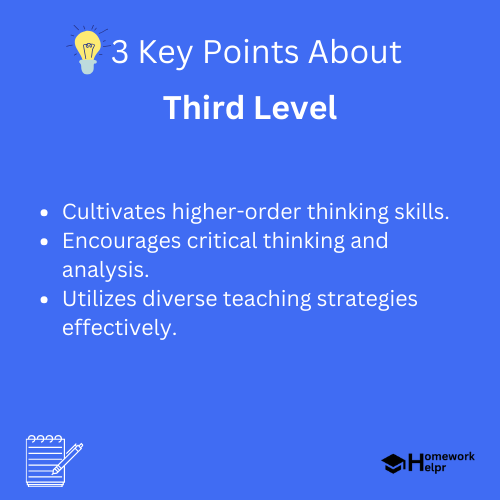📝 Summary
The third level of learning plays a crucial role in education by enhancing students’ abilities to analyze, synthesize, and create knowledge. This advanced level goes beyond simple recall and understanding, involving critical thinking and the ability to challenge existing paradigms. Through project-based learning, collaborative activities, and questioning techniques, educators can foster deeper cognitive engagement. Despite some challenges in implementation, the benefits of cultivating critical thinkers and innovators are essential for preparing students for a fast-paced world. Overall, embracing this level of learning ensures students become effective problem solvers and valuable contributors to society.
Understanding the Third Level of Learning
The concept of the third level of learning is crucial in the field of education and cognitive science. It goes beyond basic understanding and application, encouraging students to engage with knowledge on a deeper level. This article explores the importance, characteristics, and strategies associated with the third level of learning.
What is the Third Level of Learning?
To comprehend the third level of learning, it is essential to first recognize the different levels of learning, which typically categorize knowledge acquisition into three tiers: remembering, understanding, and applying. The third level, however, incorporates an advanced level of critical thinking and synthesis of information. It challenges students to not only consume knowledge but also to critique, analyze, and create based on what they have learned.
Definition
Cognition: The mental action or process of acquiring knowledge and understanding through thought, experience, and the senses.
Synthesis: The combination of ideas to form a theory or system. It often involves deriving new concepts from existing information.
Importance of Third Level Learning
The third level of learning is pivotal for developing higher-order thinking skills. As students reach this level, they cultivate the ability to:
- Analyze information critically.
- Synthesize concepts from various fields.
- Create new ideas or solutions.
This approach not only helps students excel in academic settings but also equips them with essential life skills, such as problem-solving and innovative thinking, that are invaluable in today‚’ fast-paced world.
Characteristics of Third Level Learning
There are distinctive characteristics that define the third level of learning. Students who engage in this level typically demonstrate:
- Critical thinking capabilities.
- A willingness to challenge existing paradigms.
- Behavior that reflects curiosity and a desire for knowledge.
Additionally, students become adept at distinguishing between facts and opinions, allowing them to engage in meaningful discussions and debates.
❓Did You Know?
Noam Chomsky, a prominent linguist, emphasizes that learners at the third level not only retain information but also challenge the validity and applicability of what they learn!
Strategies for Encouraging Third Level Learning
To promote third level learning, educators can implement a variety of strategies in their teaching methodologies. These may include:
- Project-based learning: Students work on real-life projects that require critical thinking.
- Collaborative group activities: These promote teamwork and exposure to diverse viewpoints.
- Questioning techniques: Encouraging students to ask open-ended questions fosters a deeper understanding.
By integrating these strategies into the curriculum, educators can significantly enhance students’ learning experiences, prompting them to think more broadly and deeply.
Examples of Applying Third Level Learning
Practicing third level learning can take different forms across various subjects. Here are a few examples:
- In science, students might design experiments that challenge existing theories.
- In literature, analyzing characters and themes critically in various contexts can cultivate a profound understanding.
- In history, comparing historical events to current issues encourages critical analysis of societal changes.
Examples
For instance, in a history class, students could research the consequences of the Industrial Revolution and draw parallels to modern technological advancements.
Challenges of Third Level Learning
Despite its many benefits, there are several challenges associated with implementing third level learning in educational settings:
- Not all students may be prepared or willing to engage at this level.
- Teachers may face obstacles in adjusting their teaching methods to facilitate deeper learning.
- A standardized education system often emphasizes memorization over critical thinking.
These challenges can be addressed through ongoing support for teachers and students alike, ensuring that they feel confident navigating the complexities of third level learning.
Measuring Third Level Learning
Assessing third level learning can be complex. Traditional tests may not accurately reflect a student’s ability to think critically or creatively. Instead, educators can utilize:
- Performance tasks that require students to apply their knowledge.
- Rubrics that assess critical thinking skills.
- Reflection journals where students articulate their learning processes.
The aim of these measurements is to gauge not only the knowledge that students acquire but also their capacity to utilize that knowledge in innovative and effective ways.
Conclusion
The third level of learning is fundamental in cultivating a generation of critical thinkers, problem solvers, and innovators. By understanding its importance, characteristics, and application strategies, both students and educators can strive for a more enriching educational experience. Emphasizing critical and creative thinking prepares students for the challenges of the real world, making them not just recipients of knowledge but also contributors to society.s

Related Questions on Third Level
What is the third level of learning?
Answer: It involves critical thinking and synthesis of information.
Why is third level learning important?
Answer: It develops critical thinking and problem-solving skills.
How can educators promote third level learning?
Answer: Through project-based learning and collaborative activities.
What are the challenges of third level learning?
Answer: Students may not be prepared or willing to engage.
